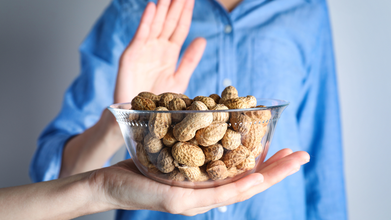- Health Conditions A-Z
- Health & Wellness
- Nutrition
- Fitness
- Health News
- Ayurveda
- Videos
- Medicine A-Z
- Parenting
- Web Stories
Parenting Habits That Creates Struggling Adults, According To Child Psychologist

Credits: Canva
Raising a child is not the easiest job. In fact, everyday feels like a new test. Somedays you would find yourself jumping to finish cleaning your child's toys even when you asked them to do. On other days, you would have a meltdown, but will have to manage to stop it.
But while you do all of these, there may be certain actions that may make your child into a struggling adult.
Child psychologist, and professor Daniel J Moran, of Touro University New York, told Newsweek, "Parents...are working overtime to make their children's lives smooth and happy. The intention is love, [but[ the outcome is often dependency."
This happens when parents remove discomfort from a child's life. The above example of the parent picking up child's toys is one such instance. If one has to apply science into it, children learn confidence by experiencing consequences and discovering that they can handle it. If parents get everything done for them, they will never know if they could handle a certain situation.
Moran says that true resilience comes from "hearing to stay present, feel the hard stuff and keep moving toward what matters."
Three Common Habits And Actions Of Parents That Could Take Away Their Child's Independence And Make Them A Struggling Adult
Fix Instead of Coach: This happens when parents jump in to solve every problem on their own. This teaches the kids that they do not have to work things on their own. Instead of fixing, parents must coach their kids, guide them into solving things.
Overpraising: While appreciating one's effort, especially when a child does something big for the first time is important. However, continuously praising your child on a day to day basis, without having to achieve something new or special could remove the learning value of effort and feedback. For every activity that a child does, praise is not the only feedback, it could also be critical in nature.
Overscheduling: Parents often feel the urge to teach their child everything, especially the things they wanted to learn as kids, but never got to. However, it leaves little room for boredom, which is dangerous, as Moran says that boredom is a place, "where creativity and self direction grow".
So, What Can Parents Do?
Moran says that the parents should let their kids "struggle safely". Parents can also model questions of acceptance of mistakes and ask reflective questions, such as "who do you want to be right now?"
"If we want confident, capable young adults, we have to let kids practice being uncomfortable,” Moran says. "Confidence doesn’t come from constant praise, but comes from persistence, problem-solving and purpose. A little discomfort today can build the psychological flexibility they’ll need tomorrow.”
Dr Samantha Whiten, clinical psychologist, owner of Best Life Behavioral Health tells Newsweek that overhelping often encourages overdependence. " Doing everything for your child when they can physically do things for themselves... trains them to depend on you for everything versus being proud and confident in what they can master on their own,” she says.
So Whiten recommends a steady approach that can build confidence. The first step is to demonstrate the task and let the child try it while you observe. Then leave the room, observe from afar, because you leaving the room would mean that you are confident in your child.
Study Links Nighttime Phone Usage To Increased Risk Of Suicide In Children

(Credit-Canva)
Suicide attempts and overdose cases are rising among young people across the country. However, what is the cause behind this rise? In a new study, researchers found a concerning link between late-night screen time and these cases.
To find out the link, a research team from the Virginia Tech Carilion School of Medicine, led by Dr. Abhishek Reddy, a child and adolescent psychiatrist, is working to find better ways for families to protect their children before a crisis hits.
The researchers talked to teenagers between 12 and 17 years old who had been hospitalized after intentionally overdosing. Their main goal was to find out the when, how, and why of these dangerous events so that parents, doctors, and schools can step in much sooner.
They looked at three things together: the time of day the overdose happened, the teen's phone or screen use just before, and the type of medicine they took.
How Does Late Night Screen Time Affect Children?
American Academy of Child and Adolescent Psychiatry explains that on an average, children between the age of 8-18 in the US spend 7.5 hours watching or using screens, whether it is to entertain, teach or just to occupy themselves.
The study found very clear patterns. Most overdoses happened late at night, often while the teens were on their phones or computers, or right after. The pills used were a mix of both prescription drugs and simple over-the-counter medicines. This shows that it's the easy access to pills, not just strong ones, that can lead to a suicide attempt.
The researchers realized that late-night hours seem to be when young people feel the most emotional stress. When that feeling is mixed with instant access to social media and medicines readily available at home, the situation becomes very dangerous.
Experts warn that even common pills we think are safe, like pain relievers or allergy medicines, can be deadly in an overdose. Knowing the time and method helps create practical prevention plans that families can actually use. This information backs up national data showing that suspected suicide attempts by poisoning among teens jumped by over 30% recently.
Can Parents Prevent Overdosage In Children?
Even though the findings are serious, they point to things every family can do right away. The researchers suggest three main ways to help prevent overdoses:
- Limit screens late at night.
- Help teens develop good sleep habits.
- Lock up all medicines—both prescription and over-the-counter.
Simple changes can make a huge difference. Parents should set "digital curfews," perhaps by using apps to limit screen time or by making sure phones and tablets stay outside the bedroom after a set hour.
Help kids create a relaxing bedtime routine, like reading a book, to help them sleep better. It is just as important to lock or safely store all medicines, count how many pills are left, and immediately throw away any old or unused pills.
The researchers also stress that talking openly and honestly with your kids is key. Distress late at night, especially after arguments or seeing upsetting content online, can lead to impulsive actions. Checking in with your children about how they are feeling and what's happening in their online life can help defuse those risky moments.
Dr. Reddy said this research gives everyone specific things they can change—things like screen time and medicine storage. This is very valuable because we can move from simply knowing there is a crisis to taking concrete steps to stop it. The team hopes these ideas will lead to new programs focused on digital safety, safe medicine habits, and support for teens in crisis who need help late at night.
The main goal is to use this data to create simple, effective ways to prevent tragedies every day. Since suicide is a leading cause of death for children, and overdoses on easily found pills are common, helping parents focus on these safety measures could save young lives.
Fewer Children Are Now Allergic To Peanuts, Study Reveals The Key To Lesser Allergies In Kids

(Credit-Canva)
Allergies are common, and anyone can develop them at any age. An allergy is an immune response that occurs when the body mistakes a harmless substance for a threat.. This then causes your body to overreact, leading to symptoms that range from mild to life threatening. One of the most common allergens is peanuts. However, recent studies have shown that there is a way we can lower the risk of developing this allergy.
A new study has found that food allergies in young children have fallen sharply since 2017, when the guidelines for introducing common allergens into the child’s diet were changed.
For many years, experts advised parents to avoid giving common allergens to their babies because allergy rates were climbing. However, a major study in 2015 discovered that feeding peanuts to infants could slash their risk of developing a peanut allergy by over 80%. Based on this finding, the National Institute of Allergy and Infectious Diseases issued official guidelines in 2017 recommending this early-introduction approach.
How Much Did Peanut Allergy Cases Go Down?
The study, published in the journal Pediatrics, analyzed food allergy rates in children under the age of three before and after the 2017 guidelines were issued. The results showed a significant decline:
- Overall food allergies dropped to 0.93% between 2017 and 2020, down from 1.46% between 2012 and 2015.
- This represents a 36% reduction in all food allergies.
- The decline was mainly driven by a huge 43% drop in peanut allergies.
- The study noted that eggs have now taken over peanuts as the most common food allergen in young children.
Can People Outgrow Allergies?
While the study didn't directly track what infants were fed, the data is highly encouraging because the drop in allergies happened right after the new guidelines were put into effect.
While the results are highly encouraging, the study noted that many doctors and parents still haven't fully adopted the new advice. Surveys show that full compliance remains low among both pediatricians and caregivers.
The study also found shifts in the racial and ethnic breakdown of children diagnosed with food allergies. Compared to the pre-guidelines period, there were fewer food-allergic children who were Black, Asian or Pacific Islander, and Hispanic in the post-guidelines period, with an increased proportion of White children. The researchers noted that these changes might reflect differences in how easily different groups can access healthcare and information about the new feeding practices.
Experts see this as a major public health success. Experts see this as a major public health success, noting that the data provide real-world evidence of how a simple public health recommendation can improve children’s health. This is particularly important for peanut allergies, which 80% of people never outgrow and can be life-threatening.
While the reasons for food allergies are still not completely understood, some scientists believe factors like higher rates of C-section births, early use of antibiotics, and increasingly sanitized environments may still play a role. However, the data suggests that early introduction is a powerful tool to protect children.
Stacey Hatfield, Australian Food Influencer, Dies Of A Rare Pregnancy Complication

Credits: GoFundMe
While most pregnancies normally and do not have any serious complications, notes Johns Hopkins Medicine, sometimes rare complications can occur and it can then interfere with normal fetal development. In such a case, Australian nutritionist and social media influencer Stacey Hatfield tragically passed away. Her husband described it as an “extremely rare complication” during childbirth. The 30-year-old Melbourne native was known for promoting toxin-free living and wholesome recipes under the handle @naturalspoonfuls, where she had more than 17,000 followers.
Hatfield’s pregnancy had been filled with joy and anticipation. She and her husband, Nathan Warnecke, were just two months away from celebrating their first wedding anniversary when she went into labour at home on September 29.
She gave birth to a healthy baby boy, Axel, fulfilling what Warnecke said was her “biggest dream in life — to be a mum.” But moments after delivering her son, the “unimaginable” occurred.
A Tragic Turn After Birth
According to Warnecke, Hatfield developed an “unforeseen and extremely rare complication” immediately after childbirth. She was rushed to the hospital, where medical staff did everything they could to save her life.
“Hospital staff were amazing and did the utmost to help, but ultimately nothing could be done despite their best efforts,” Warnecke said in a social media post announcing her passing. “Words can’t do justice to how devastating this is for myself and everyone that knew and loved her.”
He shared that Hatfield’s final moments were filled with love and happiness as she held her newborn son in her arms. “She held Axel when he was born, nursed him, saw that he was a boy, and loved him,” he wrote. “She loved him so much and still continues to love him.”
Remembering a “Lighthouse in the Storm”
Warnecke, who called Stacey his “beautiful wife, soulmate, and best friend,” said her passing has left a void that words cannot fill. “I knew Stace for nine amazing years — she was the light of my life and the reason I got up in the morning,” he said. “She was my lighthouse in the storm, and the world is less bright without her in it.”
He described her as “the most beautiful, loving, caring, hardworking, disciplined, intelligent, and trustworthy human being” he had ever known.
Community Support for the Family
In the wake of the tragedy, family, friends, and the wider community have come together to support Warnecke and baby Axel. A GoFundMe page has raised more than $20,000 to help cover funeral expenses, childcare, and household costs as the grieving family adjusts to life without Stacey.
What Are Some Of The Rarest Pregnancy Complications That Can Kill The Mother?
- Lower Urinary Tract Obstruction: a rare fatal condition that occurs when there is a blockage in the urinary tract of a developing fetus. In this condition, the urine cannot be drained, and the fluid around the fetus decreases.
- Amniotic Fluid Embolism: this is when amniotic fluid, cells, hair, or fecal matter of the baby enters the mother's blood circulation and leads to conditions like Disseminated Intravascular Coagulation (DIC).
- Pulmonary Embolism: this happens when the blood in mother becomes more coagulable and could sometimes form blood clots, known as thrombosis.
- Uterine Rupture: it is a rare complication, where the risk of it happening is less than 1%. If it occurs, it usually happens during labor.
© 2024 Bennett, Coleman & Company Limited

